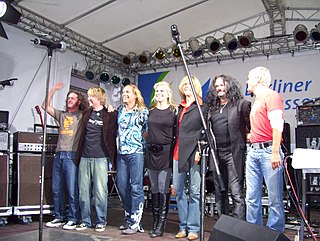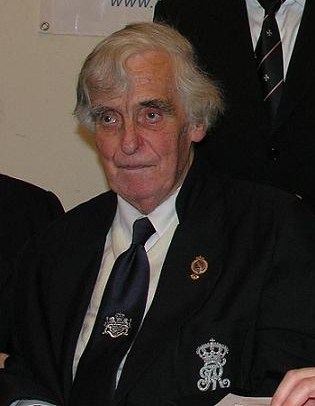
Die Ärzte is a German rock band from Berlin. The band has released 14 studio albums. The group consists of guitarist Farin Urlaub, drummer Bela B and bass player Rodrigo González. All three write and perform their songs.

The culture of East Germany varied throughout the years due to the political and historical events that took place in the 20th century, especially as a result of Nazism and Communism. A reflection on the history of arts and culture in East Germany reveals complex relationships between artists and the state, between oppositional and conformist art. In four decades, East Germany developed a distinct culture and produced works of literature, film, visual arts, music, and theatre of international acclaim. Popular culture specialities included among others a high popularity of nudism in Eastern Germany.
Lenore Tamara Danz was the lead singer and lyricist of the East German rock group Silly. She succumbed to breast cancer at the age of 43.

Silly is a German rock band. Founded in East Germany in 1977, Silly was one of the country's most popular music acts, and was well known for its charismatic lead singer Tamara Danz. Her death in 1996 ended the band's recording career after 18 years. In 2005 the surviving members began to perform as Silly again, first with several guest singers, before choosing actress Anna Loos to replace Danz. The first album with the new line-up, Alles Rot, became the band's most successful to date, reaching number 3 on the German charts in 2010.

The Publicly Owned Enterprise was the main legal form of industrial enterprise in East Germany. They were all publicly owned and were formed after mass nationalisation between 1945 and the early 1960s, and the handing back in 1954 of some 33 enterprises previously taken by the Soviet Union as reparations.

Pankow are a German rock band, founded in East Berlin in 1981. Their name came from the Berlin district of Pankow, which was once home to most of the officials of the East German government. The band's original lineup consisted of Jürgen Ehle, André Herzberg, Rainer Kirchmann, Jäcki Reznicek and Frank Hille. Other members were Stefan Dohanetz, Ingo York and Jens Jensen.

Stern Meißen is a German rock band founded in 1964 in Meißen, East Germany.
Die anderen Bands is a term combining alternative music bands of 1980s GDR. They shared a more or less open criticism of their country's political system, and a high degree of creativity which was lacking from the more established music scene of East Germany. Many members of these bands played significant parts during the time of political change Wende in 1989. The bands came from a broad range of musical genres, especially Punk, Blues, Wave, Indie and Electronic music.

Prince Albert Joseph Maria Franz-Xaver of Saxony, Duke of Saxony, Margrave of Meissen was the head of the Royal House of Saxony and a German historian. The fourth child and youngest son of Friedrich Christian, Margrave of Meissen and his wife Princess Elisabeth Helene of Thurn and Taxis, he was the younger brother of Maria Emanuel, Margrave of Meissen, who was his predecessor as head of the Royal House of Saxony. Had he been King he would have been known as Albert II

"Du hast den Farbfilm vergessen" is a pop and schlager single written by Michael Heubach (music) and Kurt Demmler (lyrics). It was first performed by East German (GDR) punk artist Nina Hagen and her band Automobil, released in 1974 prior to Hagen's punk career. The song depicts a young girl scolding her boyfriend for forgetting to bring the colour film for their camera while on vacation.
Prince Rüdiger Charles Ernest Timo Aldi of Saxony, Duke of Saxony, Margrave of Meissen was a disputed head of the Royal House of Saxony, and the only agnatic great-grandson of the last King of Saxony, Frederick Augustus III.

Thomas Kurzhals was a German keyboardist, composer and rock musician, best known as a member of the bands Stern-Combo Meißen and Karat.

Rainer Kunad was a German conductor and composer, especially of opera.

Veronika Fischer is a German singer.

Reinhard Lakomy was a German-language composer, pianist, singer-songwriter and arranger. His musical styles ranged from pop, jazz, electronic music to radio plays and musicals for children. In the German Democratic Republic, Lakomy was one of the artists with the most official releases next to the Puhdys. His most famous works include the audio musical for children "Der Traumzauberbaum", which he co-produced with his wife, Monika Ehrhardt.
Baltics was a German beat band from Rostock, who were especially well known in the north of the GDR. The band was formed in 1964 by members of the already well-known group Trio 63 in Rostock. The original Beat Quartett members were Wolfgang Ziegler, Wolfgang Fennel (guitar), Eckhardt Woytowicz and Hans-Joachim Seering (drums); the group made their first television appearances with this line-up, including "Herzklopfen kostenlos" moderated by Heinz Quermann. The band made a brief performance in the children's film "Reise nach Sundevit" in 1965 and at the request of director Heiner Carow recorded the entire soundtrack in Babelsberg. The film score was composed by Wolfgang Ziegler in collaboration with Wolfgang Fennel.

Dieter "Maschine" Birr is a German singer, guitarist and composer. He was a longtime member of the rock band Puhdys, which dissolved in 2016.

Dieter "Quaster" Hertrampf is a German guitarist and singer. He is a founding member of the rock band Puhdys.

Mathieu Karl Maria Ahlersmeyer was a German operatic baritone and actor.
Die Caufner-Schwestern was a vocal trio founded in East Germany in 1977. The members of the group were the three sisters Juliane Albrecht, Isa Kaufner and Irina Kaufner. The group mainly played disco music.














